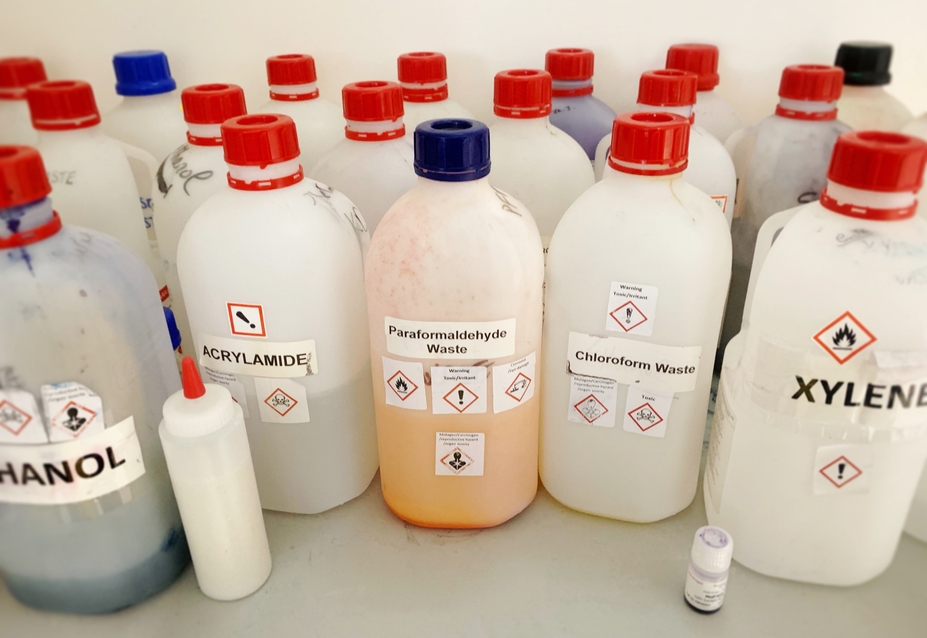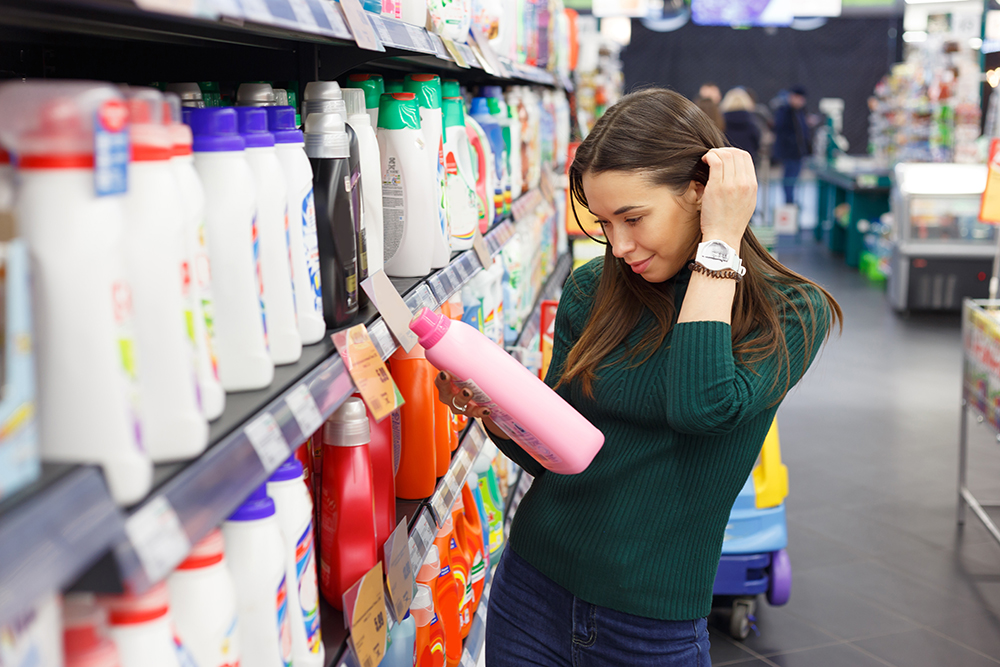DISCLOSURE: THIS POST MAY CONTAIN AFFILIATE LINKS, MEANING I GET A COMMISSION IF YOU DECIDE TO MAKE A PURCHASE THROUGH MY LINKS, AT NO COST TO YOU. PLEASE READ MY DISCLOSURE FOR MORE INFO.
A detergent is a cleaning agent with detergent properties. It is used for removing dirt, grime and/or oil from surfaces. In the United States, detergents are often made up of synthetic molecules or petrochemicals that are never fully removed, but rather break down into smaller complex molecules over time. Though detergents may be seen as essential components to everyday life and daily hygiene, there is an ongoing debate about the safety of detergents after studies have shown that detergents can cause health problems and allergies.
Is Laundry Detergent Bad For Your Skin?
It’s easy to forget the dangers of laundry detergent that we use in our homes every day. The average American washes 4 loads of clothes per week, and most laundry detergents are made with harmful chemicals and their by-products that can lead to skin irritations, rashes and even more severe health problems like cancer.
Surfactants cause skin irritability.
A quick glance at a laundry detergent’s warning label will tell you that you should avoid direct skin contact. The reason for these warnings? Detergents work by removing oils from clothes–including those natural oils produced naturally in our bodies!
Many skin conditions, including allergies and eczema, have been shown to be caused by surfactants found in household detergents. Common rashes occur when your body comes in contact with these detergents, as well as certain sensitive individuals who may break out after wearing clothes washed by conventional surfactant-containing detergent.
Detergents Can Disrupt Endocrine Function
Studies have found that the chemicals in detergents can disrupt endocrine function and interfere with hormone balance, leading to fertility issues and increased risk of breast cancer.
One of the most overlooked contributors to a range of concerns is hormone imbalance. Hormonal changes can also lead to mental impairment, heart disease and depression among other physical symptoms like weight gain or loss.
Laundry Detergent Allergies Are Rising For Sensitive Skin
In the past few years, detergent allergies have been on the rise. The detergents that are found in detergents can lead to skin rashes, sensitivity and skin conditions like eczema.
In a world where people are becoming increasingly health conscious, the demand for natural products grows. With more and more individuals suffering from allergic reactions to harsh chemical ingredients in detergents, eco-friendly companies have been making their way into the market with gentler alternatives that can be safer not only for those who suffer but also our environment as well.
The stronger the detergent is on your clothes, the harsher it may prove too sensitive skin or an allergy sufferer; this is why many turn to these new “green” options which offer safe cleaning without any of those nasty side effects!
Harmful Chemicals in Laundry Detergent That Should Be Avoided

When looking at laundry soap boxes in stores we all want to know how good they clean our clothes but if you look closely at the box label, there are several ingredients that should be avoided.
Sodium Laurel Sulphate (SLS)
Detergents could not be foamy without a little help from Sodium Laurel Sulphate. However, this chemical is used for more than just bubbles – it also helps oil mix with water to make detergents effective. The downside of SLS is that it can cause a skin irritation or worse conditions like eczema, rosacea, or psoriasis in those who are prone to such things; others may find their allergies flare up after using products containing the ingredient which they previously tolerated well.
1,4-Dioxane
1,4-Dioxane is a carcinogen that contaminates the water supply and can lead to life threatening health issues. This common ingredient in detergents and shampoos has been shown to cause benign tumors on rats as well as malignant ones from contact or inhalation of 1,4-dioxane residue contained within products like shampoo. Exposure can also occur through skin absorption or ingestion by drinking contaminated water containing this harmful chemical substance.
Nonylphenol Ethoxylate
Nonylphenol ethoxylated, a nonionic surfactant, is a known endocrine disruptor in humans and animals and is banned in several European countries. The chemical mimics estrogen so our bodies can’t tell the difference between it and actual estrogens which leads to problems with reproductive function or even cancer.
Formaldehyde
Formaldehyde is used in laundry detergent because it kills bacteria and stops the growth of mold. This chemical can be toxic for humans and has been linked to cancer. It has been shown to cause irritation on some people’s eyes or skin due from exposure and can lead to skin conditions like eczema.
Benzene / Alkylbenzene Sulphonates
Alkylbenzene Sulfonates (Benzene) are one of the oldest and most widely used synthetic detergents in use today. They may be found as laundry aids, dishwashing liquids, floor cleaners and even personal care items such a shampoos or soaps.
Benzene is toxic to aquatic life when it spills into the water, and can continue poisoning watersheds for years. It also causes eye damage and has been listed as a carcinogen for humans.
Synthetic fragrances
The fragrances in laundry detergents are a mixture of chemicals derived from petroleum that vaporize into the air and release harmful compounds like terpenes which pollute indoor air and cause health issues such as irritation in your lungs when you inhale too much VOCs (volatile organic compounds). Many people with asthma or other respiratory problems may be sensitive to artificial fragrances that can trigger their symptoms.
How to Avoid Chemicals In Your Laundry

It is clear that most laundry detergents on the market contain harmful chemicals that can cause skin irritations and expose you to other health issues with long term exposure. Eliminating these chemicals can be done while effectively leaving clothes clean and fresh.
Shop for Natural Laundry Soap
The first step is to find laundry detergent that is USDA certified organic. Safer detergents will typically be free from 1,4 dioxane, sulfates, phosphates, chlorine bleach, and synthetic fragrances.
Ingredients Matter is committed to providing all natural laundry soap that is free from harmful chemicals and is fragrance free. We are a dermatologist-tested and hypoallergenic natural laundry detergent that cleans clothes while being gentle on skin. Our customers love our natural ingredients, which include plant-based surfactants like coconut oil soap, natural salts and essential oils.
Use baking soda and vinegar
Baking soda and vinegar are good natural cleaning ingredients. Use instead of detergent and on your wash cycle. These nonirritating products can lighten and soften clothing naturally.
Make your own detergent
You can make your own laundry detergent using washing soap and borax. This product has no scent and can even reduce spending. You could use castile soap made of olive oil.
Use dryer balls instead of fabric softener and dryer sheets
Dryer balls are often made from wool or plastic but they can reduce static easily without causing irritation to clothing. They also make clothing soft without adding hazardous chemicals.
It is clear that detergents contain chemicals like 1,4 dioxane and benzene which can be harmful to your skin. To avoid these chemicals in your laundry detergent, make sure you buy detergents from an organic source or shop for natural detergent that is fragrance free. You could also use baking soda and vinegar as a safe alternative if needed on the wash cycle. These methods will help you keep your clothes clean without exposing yourself to unnecessary health risks from chemical exposure!
Sources
https://pubmed.ncbi.nlm.nih.gov/16026914/
https://pubmed.ncbi.nlm.nih.gov/23738329/
https://explore.globalhealing.com/do-you-know-these-6-facts-about-laundry-detergent/amp/#references
https://saferchemicals.org/get-the-facts/toxic-chemicals/npes-nonylphenol-ethoxylates/







Leave A Comment